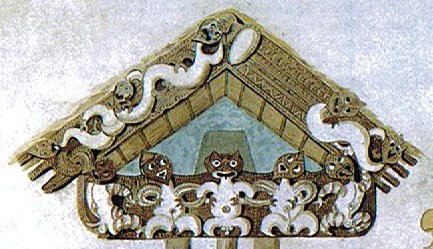10. The northern coast of the island was at hupee compared with the roof of the Taranaki storehouse:  The Sun king is loosing his head at the apex, which I read as midsummer. Another alternative is to regard the apex as winter solstice. But there are only 3 'fingers' at left, so tavake, the plunge diver, can explain why there is a vacant space beyond the egg. The Sun Bird has in his Tavake (Phaeton) 'costume' plunged into the 'river Po' far down in the southern region of the sky.
The map of Easter Island shows how the land is tilting, leaning towards left:  The beginning of spring is on Easter Island (if we follow the Taranaki picture) too far down at left and Poike to high in the east. ... Nga Tavake spoke to Te Ohiro: 'The land is sinking into the sea and we are lost!' ... The island can also be imagined as the outline of a great canoe, with its mast stretching high to Cabo Norte and with is prow down in the southwest:
|
